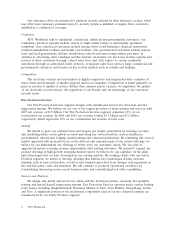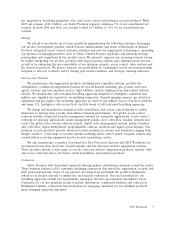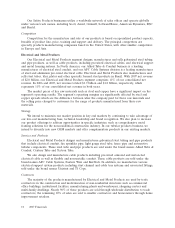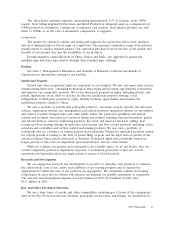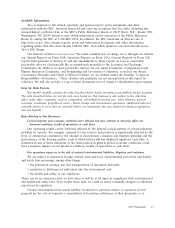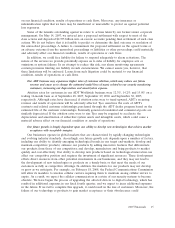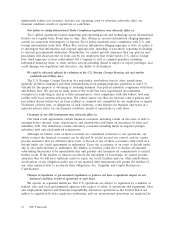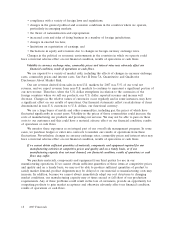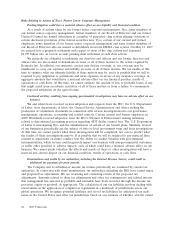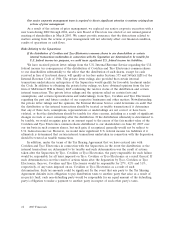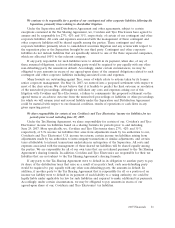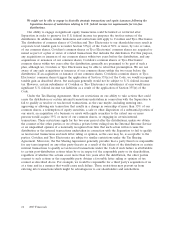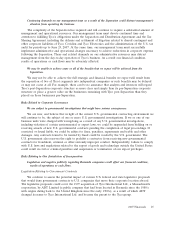ADT 2007 Annual Report Download - page 108
Download and view the complete annual report
Please find page 108 of the 2007 ADT annual report below. You can navigate through the pages in the report by either clicking on the pages listed below, or by using the keyword search tool below to find specific information within the annual report.significantly reduce our revenues, increase our operating costs or otherwise adversely affect our
financial condition, results of operations or cash flows.
Our failure to satisfy International Trade Compliance regulations may adversely affect us.
Tyco’s global operations require importing and exporting goods and technology across international
borders on a regular basis. From time to time, Tyco obtains or receives information alleging improper
activity in connection with imports or exports. Tyco’s policy mandates strict compliance with U.S. and
foreign international trade laws. When Tyco receives information alleging improper activity, its policy is
to investigate that information and respond appropriately, including, if warranted, reporting its findings
to relevant governmental authorities. Nonetheless, we cannot provide assurance that our policies and
procedures will always protect us from acts by our employees that would violate U.S. and/or foreign
laws. Such improper actions could subject the Company to civil or criminal penalties, including
substantial monetary fines, or other adverse actions including denial of import or export privileges, and
could damage our reputation and, therefore, our ability to do business.
We could be adversely affected by violations of the U.S. Foreign Corrupt Practices Act and similar
worldwide anti-bribery laws.
The U.S. Foreign Corrupt Practices Act and similar anti-bribery laws in other jurisdictions
generally prohibit companies and their intermediaries from making improper payments to non-U.S.
officials for the purpose of obtaining or retaining business. Our policies mandate compliance with these
anti-bribery laws. We operate in many parts of the world that have experienced governmental
corruption to some degree and in certain circumstances, strict compliance with anti-bribery laws may
conflict with local customs and practices. We cannot assure you that our internal control policies and
procedures always will protect us from reckless or criminal acts committed by our employees or agents.
Violations of these laws, or allegations of such violations, could disrupt our business and result in a
material adverse effect on our financial condition, results of operations or cash flows.
Covenants in our debt instruments may adversely affect us.
Our bank credit agreements contain financial covenants, including a limit on the ratio of debt to
earnings before interest, taxes, depreciation, and amortization and limits on incurrence of liens and
subsidiary debt. Our indentures contain customary covenants including limits on negative pledges,
subsidiary debt and sale/leaseback transactions.
Although we believe none of these covenants are considered restrictive to our operations, our
ability to meet the financial covenants can be affected by events beyond our control, and we cannot
provide assurance that we will meet those tests. A breach of any of these covenants could result in a
default under our credit agreements or indentures. Upon the occurrence of an event of default under
any of our credit facilities or indentures, the lenders or trustees could elect to declare all amounts
outstanding thereunder to be immediately due and payable and terminate all commitments to extend
further credit. If the lenders or trustees accelerate the repayment of borrowings, we cannot provide
assurance that we will have sufficient assets to repay our credit facilities and our other indebtedness.
Acceleration of any obligation under any of our material debt instruments will permit the holders of
our other material debt to accelerate their obligations. See ‘‘Liquidity and Capital Resources—
Capitalization’’.
Changes in legislation or governmental regulations or policies can have a significant impact on our
financial condition, results of operations or cash flows.
We operate in regulated industries. Our U.S. operations are subject to regulation by a number of
federal, state and local governmental agencies with respect to safety of operations and equipment, labor
and employment matters and financial responsibility. Intrastate operations in the United States are
subject to regulation by state regulatory authorities, and our international operations are regulated by
16 2007 Financials


